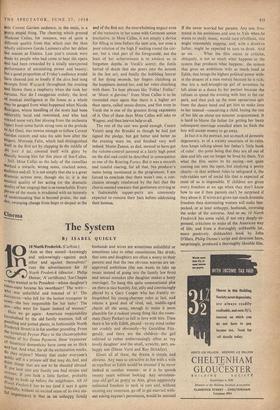Cinem a
The System
QUIGLY BY ISABEL 11131/ 10 North Frederick. (Carlton.) 'AND so they sinned—knowingly and unknowingly—against each other and against themselves!' runs the advertisement for 10 North Frederick (director : Philip Dunne; 'A' certificate). 'Joe Chapin --Who wanted to be President—whose daughter's room-mate became his sweetheart! The WIFE— Who was unfaithful and boasted of it ! The IMUGI-ITER—who fell for the hottest trumpeter in town—the boy responsible for her baby! The s°N—who went for liquor instead of women!' Here We go again : American respectability (sYmbolised by the old family mansion, full of Panelling and potted plants, in fashionable North Frederick Street) is in for another pounding. From the hysterical Peyton Place to the claustrophobic realism m of No Down Payment, these 'exposures' 431 American domesticity have come on us thick and fast. And what, for all the exclamation marks, do they expose? Merely that under everyone's think self is a private self that may do, feel, and If things that are not to be shouted abroad. I You look into any family you find strains and stresses; if you look a little farther, probably things to hush up before the neighbours. All 10 tastefully, Frederick has to say (and it says it quite a ausltefully, without an excited sense of its own shi- t importance) is that in an unhappy family husbands and wives are sometimes unfaithful or sometimes take to other consolations like drink; that sons and daughters are often a worry to their parents and that the two obvious worries are un- approved ambitions (the son wants to take up music instead of going into the family law firm) and sexual mistakes (the daughter makes a hasty marriage). To hang this quite unsensational plot on there is nice humbly Joe, ably and convincingly played by a Gary Cooper who has frankly re- linquished his young-charmer roles at last; and retains a good deal of tired, sad, middle-aged charm all the same, enough to make it seem plausible for a radiant young thing like the room- mate (Suzy Parker) to fall in love with him. Then there is his wife Edith, played—to my mind rather too crudely and obviously—by Geraldine Fitz- gerald; and there are the children—the girl referred to rather embarrassingly often as 'my lovely daughter' and the small, scratchy, pert, un- happy son (Diane Varsi and Ray ,Stricklyn).
Given all of these, the drama is simple and obvious. Any man as attractive as Joe with a wife as repellent as Edith would be unusual if he never looked at another woman : as it is he spends twenty years without looking. Any seventeen- year-old girl as pretty 'as Ann, given .apparently unlimited freedom to neck in cars and, without exciting any comment, go off to get married with- out asking anyone's permission, would be unusual if she never worried her parents. Any son, frus- trated in his ambitions and sent to Yale when he wants .to study music, would turn rebellious, one might reasonably suppose, and, with a drunken father, might be expected to turn to drink. And so on. . . . What the film seems to criticise, obliquely, is not so much what happens as the system that produces what happens : the system that gives an ambitious wife as much head as Edith; that brings the highest political power with- in the dreams of a man merely because he is rich; that lets a well-brought-up girl of seventeen be left alone at a dance by her partner because she refuses to Spend the evening with him in the car park, and then pick up the most uproarious spiv from the dance band and get him to make love to her instead—conceiving a child, basing the rest of her life on about ten minutes' acquaintance. It is hard to blame the father for getting her hasty subsequent marriage annulled when he finds the boy will accept money to go away.
In fact it is the portrait, not so much of domestic degeneracy, as of a society uncertain of its rules. Ann keeps talking about her father's 'little book of rules' : the point being that they are all out of date and life can no longer be lived by them. Yet what the film seems to be saying—not quite coming out into the open, but implying it pretty clearly—is that without rules to safeguard it, the rule-ridden sort of social life that is expected of most of us is impossible. If children are given every freedom at an age when they don't know how to use it then parents can't be surprised if they abuse it. If wives are given too much domestic freedom then dominating women will make hen- pecked, or at least unhappy, husbands, reversing the order of the universe. And so on. 10 North Frederick has some valid, if not very deeply ex- pressed, criticisms to make of the American way of life; and from a thoroughly unlikeable (or, more positively, dislikeable) book by John O'Hara, Philip Dunne's script and direction have, surprisingly, produced a thoroughly likeable film.


































 Previous page
Previous page